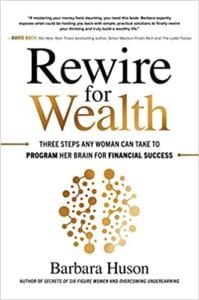
How do you attract money into your life? Many women have been told that handling and managing money is a man’s job, resulting in women being afraid of money. So they end up repelling rather than attracting wealth! Barbara Huson, the author of Rewire for Wealth: Three Steps Any Woman Can Take to Program Her Brain for Financial Success, joins Monick Halm to share her story on how she overcame various obstacles to achieving financial success.
In this episode, she shares three steps on how you can change your mindset to attract money into your life. Plus, she also gives some practical tips on how to become money-smart. Tune in and be inspired to receive, manage, and save money to enjoy financial freedom!
—
Watch the episode here:
Listen to the podcast here:
How Women Can Attract Money In Their Life With Barbara Huson
I am excited now to be interviewing someone who I consider a dear friend and beloved mentor. She’s somebody who has shaped so much of my relationship with money and wealth. Ms. Barbara Huson, who is the author of many books. She is a woman of wealth expert. She is a financial coach. She has a genius way of helping women around money. She’s authored seven books, the latest of which is this amazing book, Rewire for Wealth: Three Steps Any Woman Can Take to Program Her Brain for Financial Success. I’m super excited to have her with us to talk about real estate, wealth, and the brain. Welcome.
That was a lovely introduction. Thank you so much.
You’re welcome. Thanks for being here. This is a show where we share stories and stories about investing. I love your story. It’s a story of money and how you came to be a wealth–and–woman expert and also what role real estate played for you. Go ahead and share your story because that’s not where you started.
No, I grew up wealthy. My father was the “R” of H&R Block. The only advice he ever gave me about money was, “Don’t worry.” Under that was, “There’ll always be a man to take care of you.” I thought that was great advice. I didn’t understand money. I just wanted to spend it. There was always a man. I’m married. My husband was a stockbroker. He was perfect. What I found out very early in our marriage was he was a compulsive gambler. Over the course of our fifteen years of marriage, I found out every year, many times a year, he was gambling my money and inheritance away. The insane part was I continued to let him manage it. That’s how terrified I was and intimidated by anything financial. Finally, after fifteen years, I decided money is not my thing. I do not want to deal with money.
It was funny. If you don’t deal with your money, your money will deal with you. I got tax bills for way over $1 million. My ex didn’t pay for illegal deals he got us in. My signature was on everything. I signed whatever he told me to sign. My ex had left the country. I didn’t have anywhere close to $1 million. My father wouldn’t lend me the money. That’s when I knew I had to get smart. I started reading and going to classes. My eyes would glaze over. My brain would fog up. I couldn’t understand a thing. I had three young daughters. One was just a baby. I was not going to raise those girls on the street. I was committed. I was going to get smart. I didn’t know how.
I believe when you make a commitment, no back door, no holds barred commitment, the universe revolves to help you reach your goal. I was a journalist writing for the San Francisco Business Times. I got hired for a freelance project to interview women who were smart with money. Those interviews changed my life. I not only got smart about money, but I wrote my first book, Prince Charming Isn’t Coming: How Women Get Smart About Money. Suddenly, I had this whole new career. Here I am, seven books later, talking to you about money. Who would have thought?
Tell us about real estate. Real estate played a big part in that story.
When you make a no holds barred commitment, the universe revolves to help you reach your goal. Share on XReal estate saved me. I had all the investments my father had put in the trust. My father loved real estate. That’s the only thing my husband couldn’t get to. I think I had 3 or 4 properties. He couldn’t get to them. While I had no money, I had those properties that threw off an income. If I lived frugally and saved carefully, I knew me and my daughters would be okay and here I am.
That’s the beautiful thing about real estate and how it can leave a legacy for people. Your dad created this legacy that, to this day, continues to spin off money for you and helped save you. It’s a wonderful way to have money throughout your lifetime, but it’s also a wonderful legacy one can leave for others. Now, I’d want to talk more about this Rewire for Wealth. In this book, you started sharing that story. It’s like you knew that your husband was gambling your money. You stayed in this relationship for many years despite that. Tell us a little bit more about how our brains get wired to not be smart about money and not to make decisions. How do you rewire?
I was very clearly told, not just by their actions, but by their words that, “Making and managing money is a man’s job.” I was programmed to believe that I was incapable of managing money. That’s what I acted on. It wasn’t until a few years ago when I discovered Neuroscience. I was looking at my email, and an article about Neuroscience was there. I knew nothing about it. I read it. I swear, it was like a part of my brain was lit up like a Christmas tree. I said, “This is it. This is the missing piece. This is what I need to add to my body of work to expedite the learning curve and help women get past the resistance.“ Our behavior, the choices we make, and the things that we do are controlled by our brain.
I’m holding my fist. This is meant to be the brain. It’s programmed. It’s controlled by our brain, which is a physical organ in our body. What we don’t understand and what I didn’t understand is how the mind and the brain work together. The mind is a non-physical entity and the source of thoughts and feelings. What flows through our mind, our thoughts and feelings, is what programs our brain? If you want to change your behavior, powering through, working hard, and trying to go against a hardwired neural pathway is like going against gravity. It’s hard. What makes it much easier is if you can train your mind to start thinking differently, feeling differently, then you can reprogram your brain and start building new neural pathways. Shifting your behavior is so much easier.
Give an example of how a thought might get in our way. What can happen if it’s rewired?
I‘ll give you the three steps to rewire. When you notice you have a negative thought, an unhealthy thought, an unwanted thought, it is determining your behavior, especially if you think that often enough. For example, “I’m not enough. There’s never enough.” Mine, the one that I have a lot is, “I don’t have what it takes.“ I know that came from. My family of origin. I’m a girl. I don’t have what it takes to make a lot of money. I’ll tell you the first three steps, then I’ll explain how to do it. The steps are recognize, reframe, and respond differently. Recognize means you observe. You recognize the negative thought. You recognize it with curiosity and not criticism or judgment. For example, “I‘m having a thought about not being enough. I’m having a thought about there’s never enough. I’m having a thought that I don’t have what it takes.” Isn’t that interesting?
What you’re doing is you are taking that thought and you are separating from it. Not, “I don’t have what it takes,“ but, “I am having a thought about I don’t have what it takes.” It‘s not the truth. It’s just a thought. You recognize it with curiosity, and then you reframe it. How can you see this differently? There must be another way to look at this. Instead of, “I’m not enough,“ it could be, “I’m enough. I can handle this. No problem.“ You don’t have to believe it. If it’s repeated often enough, it will start becoming a new neural pathway and start deadening the old one that says, “I’m not enough.” You recognize with curiosity. You reframe by finding a different way to interpret it, and then you respond differently. You know it doesn’t feel normal and right. It’s scary. Everything in your brain is saying, “Don’t do this.“ That’s the old neural pathway saying, “Don’t do this.” You respond differently. You do this over and over again. What was very difficult in the beginning will become easier.
I used this process. I had this belief that I can’t save money. Being part of your program, doing that, recognizing it, and then going, “I‘m a great money manager.” That became my new path. The money came in. I set aside a percentage, 25% went there, 10% here. I was saving money. I was like, “I’m a great money manager.” I was putting this money aside into different accounts and buckets, and then it shifted.
That’s beautiful. That’s exactly how it works. Keep reminding yourself. Keep reframing. Keep telling a different story over and over again. Your brain will want to go back. It will always take the path of the least resistance, which is the strongest neural pathway that says, “I can‘t say it.“ You refute it every time, “I’m a great money manager.” If you do that, it’s miraculous what will happen. Not only that, but what I didn’t expect when I started with this is you start seeing other things differently. You start seeing ways that you can save money that you haven’t noticed before. Your brain will only see and will only do what it confirms as a belief. You start shifting that belief in another path. All of a sudden, the blinders are taken off your brain. You start seeing things that you didn’t see before.
I love the brain stuff, too. It’s Neurobiology. It’s so fascinating. I’m also a student of wealth building. Let me ask you a question. I want to back up a little bit. I love asking about mistakes that we made and what we learned from them. What was your biggest mistake around money or investing? What did you learn from it?

Rewire for Wealth: Three Steps Any Woman Can Take to Program Her Brain for Financial Success
My biggest mistake was turning a blind eye to it by avoiding it. Many women’s coping skill with money is avoidance. It can feel overwhelming in the beginning. Anything is overwhelming if you don’t know what it is. When I gave birth to my first baby, it was overwhelming. We learned. My biggest mistake was turning a blind eye to my money, even as I saw it being frittered away. As I wrote in one of my books, “In our deepest pain lies our highest purpose.“ The pain of avoiding my money became my life’s purpose to help other women avoid that trap.
For one, I’m happy that you did that. The advice I would give is to get this book, Rewire for Wealth. If there are exercises in it, you’re working and putting this into practice. It’s very powerful. What advice would you give to a woman who’s starting out, wanting to invest, and wanting to get better with her money? What advice would you tell her?
First of all, take it slow. Don’t do anything for 3 to 6 months to a year. What happened when I started saying, “I’m handling this,” I started understanding it. I jumped right in, made an investment, and lost a ton of money. I jumped right in again, made an investment, lost a ton of money, and decided, “Wait, stop.” I gave myself a year. You don’t have to give yourself a year. I, with no confidence and self-esteem, gave myself a year. It was smart. I learned that, “Don’t invest in anything you don’t understand, whether it’s a stock, a bond, or a piece of real estate.” Not only do you not know what you’re buying, but you don’t understand or know how to evaluate the information to know when it’s time to sell.
What I did were three things. I took three steps. I believe, “Give yourself time. Do these three steps. Small steps consistently taken create remarkable results.” Here are the three steps. Every day, read something about money, even if it’s just for a minute or two, even if you’re opening the business section of the newspaper and perusing the headlines. Even if you’re standing in the grocery store in line, you pull out a money magazine in a set of people and leaf through it. Even if before you go to bed, you get a finance book or a finance magazine, and you read one paragraph for a minute or two. I call it the Osmosis School of Learning. Much of getting smart or smarter is familiarizing yourself with the jargon and the current trends. Every day, read something about money, even if it’s for a minute or two.
Second, every week, have a conversation about money, preferably with people who know more than you. It’s our secrecy and silence that keep us stuck, especially women. What you’re doing with your Real Estate Investor Goddesses is so important because you’re getting women together to talk about money. For most of us, when was the last time you went out with a girlfriend, family member, or colleague and said to them, “How did you get smart about money? What did you do? What were your biggest mistakes? What did you learn? What would you advise me?” Every week, talk. Every month, save. What you were saying, every month, save automatically. It’s best to do it automatically. You have small amounts. Have $10, $20 transferred from your checking account or payroll check to a savings account. With compounding, it will add up. You could do the same thing with investing. Every day, read. Every week, talk. Every month, save.
Give yourself time and take consistent small steps to create remarkable results. Share on XCan I ask you more about these deals that went badly?
Yes.
I would love to get specifically what that mistake was. What did you learn from those in particular?
The first mistake I made was I invested some money in the market willy-nilly. I put money in stocks. I don’t even remember what I bought, but I put money in stocks. I didn’t understand what I was buying. Maybe they were good stocks. Maybe they weren’t. I hired a financial advisor. His name was Bill. He told me to put money in stocks and I did. He sent me all these statements and all those things they sent you. I didn’t read them because I didn’t understand them. This was in 1986. We’re doing great, I guess. I’ve talked to them every couple of months. I’d say, “How we’re doing?” He’d say, “Great.“ I’d say, “Fine.” When it was October 19, 1987, we had the worst crash we’ve had since the Depression.
I immediately called him and said, “Bill, get me out of the market and get me out now.“ He said, “Barbara, please don’t. The stock market will always go back up. You’re going to have capital gains tax to pay.” I didn’t know the market will then go back up. I didn’t know what the capital gains tax was. I wanted my money where it is, in the bank. I sold and lost a lot of money. I’d be so much richer now. The market went up right away. What I learned was you don’t make a decision based on emotion. You need to understand what you’re investing in. You need to understand that there will be losses on the way to gains overall.

Attracting Money: If you don’t deal with your money, your money will deal with you.
The second mistake is a friend I had who was out of the market. A friend of my father’s called me. He said, “I’ve got this great thing.” This guy was rich and smart. My father had the utmost respect for him. He said, “It was a limited partnership.“ I didn’t know what a limited partnership is. It was a company that made cinnamon buns. I knew what cinnamon buns were. I didn’t know what a limited partnership is. I bought into it. I didn’t know that in a limited partnership, you couldn’t sell. There was no market to sell. It went belly up and I lost it all. That’s when I realized, you never put money in everything you don’t understand. Just because someone who is smart tells you something is good, you do not buy into it. You understand it and do your due diligence. I took that year and I studied.
Thank you for sharing that. It’s true. I always tell people, “Never invest in if you don’t understand. If you don’t feel comfortable, you don’t understand it.”
The other thing is you don’t put an amount of money in any one investment that you can afford to lose. At least, in these investments that I spoke about, it didn’t take food off the table. It didn’t leave me penniless. That was another lesson I learned.
To what do you attribute your success?
Don't make a decision based on emotion. Share on XPassion. It was like, God gave me these parents and that gambling husband because this is what I’m put on earth to do, to help empower women financially. No matter how hard things get, no matter how scared I get, and I get scared a lot, I have a higher purpose.
You were talking about being a money avoider. I was a money avoider for much of my life. I always had a good income, but money was a very stressful thing in my house. When it came time to pay bills, there was fighting and yelling. There were things being thrown. There was some anger around bill-paying time. I did not come from a wealthy family. I had this association with money that it was very stressful. It’s not a fun thing to deal with. It makes people angry. I don’t like people to be angry. Let’s not deal with that.
I dealt with things when I had to. Normally, when the second envelope came overdue, we were like in a battle or whatever. It was like paying late fees. I was not dealing with it. When I was going to get married and got engaged, I thought I can’t bring this financial chaos into a marriage. Money issues can be a big stressor in marriages. I thought, “I need to get smart about money.” That’s when I started reading your books. I got Prince Charming Isn’t Coming, Overcoming Underearning, and Secrets of Six-Figure Women. I started to read your books, do this work, learn more about money, and do these processes. I’m very appreciative of you.
Thank you. Here you are, paying it forward helping other women.
What we focus on here on this show is real estate investing, but ultimately, it’s a money game.
I’m going to tell you something else. I don’t think it’s about money. I’m convinced after many years in this business of working with women, women’s difficulties with money have very little, if anything, to do with money. It has to do with their fear or ambivalence about power. It’s who they have to become to be a container that can attract, sustain, and grow their wealth. They have to step into their power. My definition of a powerful woman is someone who knows who she is, who knows what she wants, and expresses that in the world unapologetically. Essentially, our fear of power is our fear of becoming all of who we’re meant to be, of becoming a self–sufficient, independent adult instead of watering ourselves down we don’t make waves.
I don’t remember where I heard this. It was like, “For so many women,” this is almost like in our fiber, “showing up fully, powerfully, got you burned at the stake.“ There’s a lot of fear. I remember I had to do something like a past life work. I had almost been burned at the stake in a past life. I was like I had to hide all my gifts.
Women, over the centuries, have suffered debilitating consequences and punishment for expressing who we are for being powerful in the world. That is part of our collective unconsciousness. That is a lot of what we need to overcome. I bought a new car. The guy asked what I did. I said, “I work with and I write books about women and money.” He went, “Women and money? Why do women need books about money? We all do.” Of course, they don’t understand, but we have our own set of issues that are very real.
The world needs empowered women more than ever.
According to the Dalai Lama, “That’s just going to save the world. Our Western women must be empowered.“ As Mother Teresa said, “It takes a checkbook to change the world.“
You can’t be poor enough to help other people out of poverty. It’s only through your abundance.
There was a tribute to Abe Lincoln. He said, “If you want to help a poor person, don’t be one.”
I know you’ve shared about this before. What are some of the differences between men and women when it comes to money?
I think the thing that convinced me to delve into Neuroscience deeper was when I read that men’s and women’s brains processed financial information differently. Men are much more transaction–oriented. Women are much more other–oriented. It’s like what the money can do to help others. The thing that opened my eyes when it came to investing was that men see investing as a challenge. It’s exciting for them. Women see investing as a threat. They get scared. From the beginning of time, billions of years ago, our brains have developed for one reason and one purpose only and that is our survival, to keep us safe. Anytime we feel threatened, our rational brain shuts down and our fear center is activated. We go into fight, flight, and freeze. That’s how many women act to investing. That’s what got me. It’s not just a matter of learning the facts, it’s a matter of building new neural pathways to let us know it‘s safe. It‘s the way we protect our future and families, by investing.
That’s why it’s so important to rewire that.
It’s very challenging to rewire. Even I, who wrote the book, still find myself being challenged by rewiring. I always keep what I need to learn.
This has been such a great conversation. We’re going to end with our famed end–of–show trinity, a brag, gratitude, and desire. Before we do that, how can people connect with you and find out more about what you do?
The best way to connect with me is my website, Barbara-Huson.com. That’s the best way to connect.
Check out her program. I’ve been part of Barbara’s Wealth Connection Program. It is phenomenal and life-changing. You have a Rewire Program that’s great. Go to the website, Barbara-Huson.com and find out more. Time for our Trinity. What is one thing you’re celebrating? What’s your brag?
I brag that I wrote a book. It is so hard to write a book for me. It does not come easy. It was like my brain is saying to me, “You write like crap. No one’s going to read this,” but I did it. I finished my seventh book. I brag that I did it. I was scared and still did it.
What’s one thing you’re grateful for?
I am grateful for my passion. I am grateful that I have a purpose. I am grateful that I know what my purpose is. Do you know what I’m grateful for? That sounded good. What I am grateful for is my three daughters. I have the best daughters. I wasn’t always the best mother, but we are so close now. That’s what I’m grateful for.
Last but not least, what’s one desire?

Attracting Money: If you can train your mind to start thinking differently, then you can reprogram your brain and start building new neural pathways.
One desire is I have been on many bestseller lists, but I have never been on the New York Times Best Seller list. It would be so cool to be even mentioned in the New York Times. I’ve had that desire with every book. This is my eighth book. My first one was in the ’80s. It’s no longer in print. That was always my desire. I’m sure this is my last book. This is my time.
So shall your desire be or so much better than you can imagine, under grace and in perfect ways. Guys, buy Rewire for Wealth. Let’s get her on the New York Times Best Seller list. I’ll buy my copy. It works if you go to Amazon or anywhere, right? It’s also in bookstores. Fingers crossed, I see it happening. It’s an amazing book. It should be on the New York Times Best Seller list. Thank you so much for coming. You all can connect with Barbara on her website, Barbara-Huson.com. Connect with me at REIGoddesses.com. There you can find out about our training, events, and Investor Club. Get our free guide, Investing in Real Estate from $1 to $1 Million: Investing Strategies for Every Budget and Every Goddess. Subscribe to the show. Like it, share it with your friends, and come back next time for another amazing Real Estate Investor Goddess’s interview.
Important links:
- Rewire for Wealth: Three Steps Any Woman Can Take to Program Her Brain for Financial Success
- Prince Charming Isn’t Coming: How Women Get Smart About Money
- Overcoming Underearning
- Secrets of Six-Figure Women
- Barbara-Huson.com
- Wealth Connection Program
- Investing in Real Estate from $1 to $1 Million: Investing Strategies for Every Budget and Every Goddess
About Barbara Huson
 Barbara Huson (formerly known as Barbara Stanny), is the leading authority on women, wealth and power. As a bestselling author, financial therapist, teacher & wealth coach, Barbara has helped millions take charge of their finances and their lives.
Barbara Huson (formerly known as Barbara Stanny), is the leading authority on women, wealth and power. As a bestselling author, financial therapist, teacher & wealth coach, Barbara has helped millions take charge of their finances and their lives.
Barbara’s background in business, her years as a journalist, her Master’s Degree in Counseling Psychology, her extensive research, and her personal experience with money give her a unique perspective and makes her the foremost expert on empowering women to live up to their financial and personal potential.
Barbara Huson has been featured on Good Morning America, The View, Extra, The O’Reilly Report, and many times on CNN, MSNBC, CNBC, Fox News, PBS and NPR, as well as the New York Times, and USA Today.
Love the show? Subscribe, rate, review, and share!
Join the Real Estate Investor Goddesses Community today:





